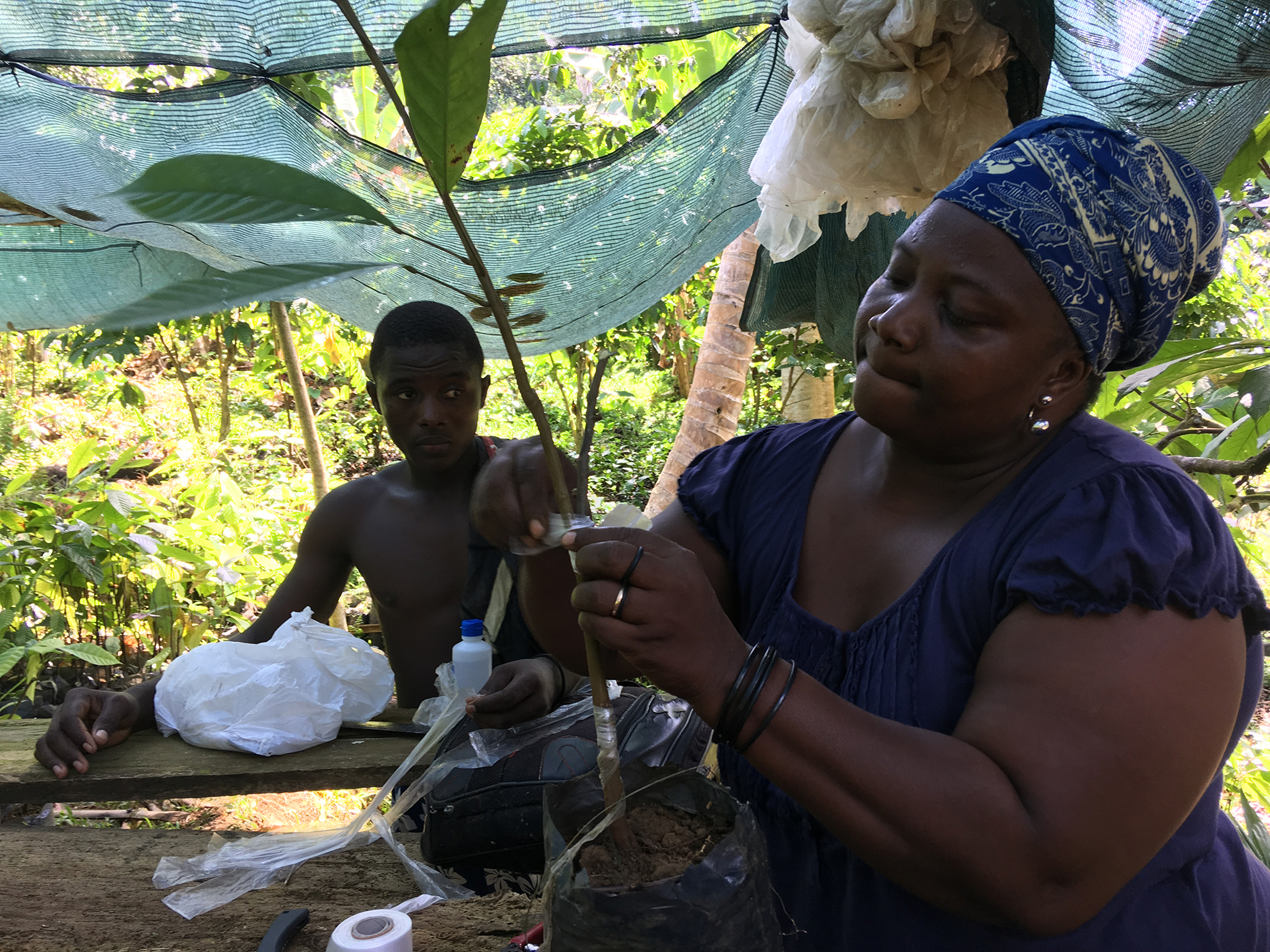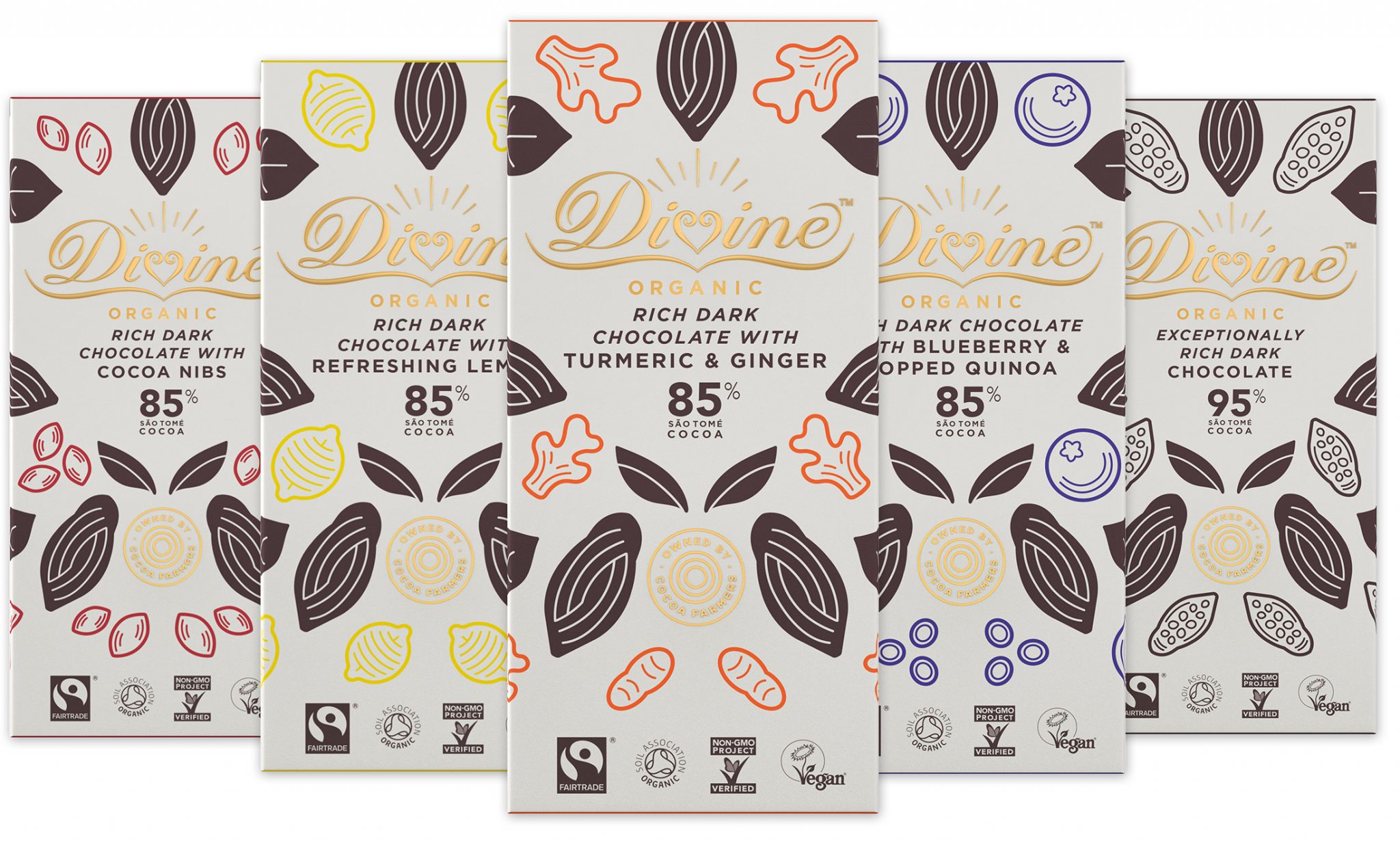The island nation of São Tomé and Príncipe is in the Gulf of Guinea, off the western equatorial coast of Central Africa. In the 19th century, as a Portuguese colony, it produced so much cocoa under slavery regimes, that it was nicknamed ‘Chocolate Island’. It gained independence from Portugal in 1975 and today cocoa production is in the hands of co-operatives, including CECAQ-11.
This year, the CECAQ-11 co-operative began supplying the cocoa for Divine Chocolate‘s first ever organic dark chocolate range. Flavour combinations in the new range include ginger and turmeric, lemon, and blueberry and popped quinoa – and to celebrate the launch, two members of the co-op visited Divine in the UK and Germany. In the UK leg of their trip, they visited one of Divine’s co-operative distributors, Suma Wholefoods in Yorkshire.
It was here that Co-op News caught up with Hortência Pina and Adalberto Luis to learn more about cocoa farming and equality in the Gulf of Guinea. Hortência is a farmer member and the co-operative’s logistics manager. Adalberto has been with the organisation since it set up in 2009, initially as head of production, and as CEO since 2014.
How did you get involved in the Co-op?
Adalberto Luis: I used to work for an NGO – Zatona Adil – which helped CECAQ-11 set up. I have qualifications in business management, helping small businesses, and in people management, and worked as a business manager helping farmers to organise. I am passionate about working with people in the rural world and seeing them develop.
Hortência Pina: I first got involved as a farmer member after starting to farm my own land 11 years ago. I worked as a treasurer and am trained in different farming skills, which I teach others. As head of logistics, I organise inputs for the member associations, as well as their equipment, and arrange transportation of the cocoa and other items.
How many members does CECAQ-11 have?
AL: The co-op is made up of 20 communities, with a total of 1,135 farmers – 393 of whom are female. We started in 2009, and in the first year produced eight tonnes of cocoa. In 2017 we produced 300 tonnes and the projection for this year is 400-450 tonnes. By 2020 we aim to produce 700-800 tonnes.
What are the main aims of the co-op?
AL: To produce high quality, organic cocoa while empowering our farmer-members. At the moment we are reinvesting in the land parcels (farms)
of each individual producer to maximise the potential. We specialise in selling to niche markets, so another aim is to maintain the quality of the cocoa; we have to obtain the biological certificates and the Fairtrade certificates to access these markets.
What are the main challenges you face?
HP: Maintaining the quality of the cocoa while keeping up the production level – making sure that they are producing in the right way. And encouraging more producers to become members.

Where does your cocoa go?
AL: We have a partnership with GEPA in Germany (Europe’s largest Fairtrade trading organisation) which buys our organic cocoa; through them we recently established a partnership with Divine Chocolate which is using our cocoa to launch it’s first organic range. In the future we would like to be more involved in the process of turning cocoa into chocolate.
What is CECAQ-11’s co-operative difference?
AL: We are fully transparent and democratic, and everyone gets a say and a fair share of the profits. We have annual meetings, and an open register so every producer can check how much cocoa they delivered and when, so they can match their records to those of the co-op. The co-op has been instrumental in enhancing working conditions, as well as local infrastructure – it helps with electricity supply and improving the access roads.
HP: We also have the Fairtrade premium – $200 per tonne of coca produced – that is used for social infrastructure. One thing the premium has been used for is a kindergarten for the producers’ children. The aim is to give education and have the kids in a safe environment, while enabling the parents to concentrate on working and producing the best cocoa they can.

How is the co-op empowering women?
HP: There are issues around equal rights in São Tomé and domestic abuse is a big problem, partly because of a government initiative which divided land between the farmers. This could have been good, except they only handed out one land title per married couple. The husbands are often bad at sharing the income, even when they are both equally working the land. This leads to a lot of conflict.
Luckily my husband Manuel is a good husband, so we have not fought over land or income! In 2013 I took this problem to the government, and they gave all the women we had gathered their own land titles. Things are now better for those women, but I still worry for those who could not join us.
We have a ladies association at the co-op to make sure the women have the same rights as men, that they work in the same way and have the same say. There are women in important positions, so the co-op is good at encouraging women to more fully participate, but not all of them want to, or think that they can. But they are wrong. If more women got involved, it would make sure more actually got done!
How are co-ops regarded in São Tomé?
AL: All the co-ops have had government support. They have to register as a co-op. There are two cocoa co-ops (the other cocoa co-op is about three times
the size of CECAQ-11, but it isn’t registered Fair trade), and the island also has a spice co-op and a coffee co-op, and lots of others not linked to agriculture. There are only 200,000 people on the islands – everyone knows what everyone else isdoing, so most people know about co-ops
- Meet more players from the co-operatives sector here.

